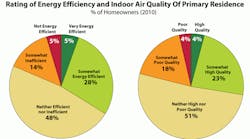Over the course of 2012, this space will identify opportunities within customers' homes that you may not have observed in the past. The opportunities are based on a recent homeowner survey conducted by Decision Analyst, Inc.
Q: What do contractors need to know about "early system retirement" offers by local utilities?
A: I’ve been researching energy utility programs. There are many programs out there, many of which are new. One utility in particular had built a very positive program to help customers retire low efficiency equipment which is still in good shape, with part of the down payment and a long-term payout. They have a need to help their customer and community, and this was one way they decided to help: eliminate old, inefficient equipment in their market that wouldn’t otherwise need to be replaced for years.
Is the utility right? Do we have a reason to retire old equipment early? Are there really that many old, inefficient systems out there?
Among the over 75 million homeowner-owned houses in the U.S., on average, there are as many working residential central air conditioners installed before February 2002 as after; as many central furnaces installed before January 2000 as after; as many central heat pumps installed before March 2003 as after; and as many central boilers installed before April 1999 as after.
Should You Rethink Your Sales Efforts?
For years, many contractors have taken pride in helping homeowners keep their old units working long after they should have been replaced. Your hearts were in the right place, and you were saving homeowner’s first costs they were ill-equipped to spend. Unfortunately, saving them upfront costs only prolonged the escalating energy costs they continued to pay each month, as well as the costs to fix their systems when the units failed again and again.
Who’s in the best position to decide the energy level of your customer’s purchase? Simply replacing inefficient equipment with the new standard equipment may not be enough. Often, based on your own best estimates, many of you have chosen not to give your homeowner customer an energy efficiency choice when you have recommended a new system. In fact, seven in 10 homeowners who bought a new system or part of one in the past two years, said they weren’t given a choice of energy efficiency level. They simply bought what their contractor consultant sold them.
Do You Owe Your Customer All of The Facts?
Part of your selling procedure may make it important to close the sale quickly. By not offering efficiency levels you don’t complicate their decision with too many options. Unfortunately, in deciding for the homeowner, you have often locked many into a standard efficiency system.
If someone can’t afford first cost, how can they afford the escalating price of energy to keep the less efficient systems running?
Do You Know All of the Facts You Should Know?
Your decision, because it affects equipment that comprises the greatest energy usage in the home, has far reaching ramifications.
Is the government’s energy threshold legislation where it should be?
The government has legislated pretty high standard efficiency requirements. Are they enough?
I, for one, don’t like legislation that limits my freedom, but I do understand federal legislation that keeps local legislation from taking over, and federal law that helps manufacturers build what’s needed at a larger scale. But if the federal regulation is more broad- based, and there are greater needs for more energy efficiency, or less need locally, who steps in to help? You? Who else?
Signs that simply selling standard efficiency products isn’t enough seem to be out there. North American energy grids have helped, and when they were completed, most electric utilities dropped their demand side management departments. Now, with grids available for a few years, electric utilities are once again building demand-side management groups and giving them more difficult tasks in many markets. Is yours one of those?
Are There Better Ways to Support Your Customers?
This time of year, when for most of you, the business is less busy, work with your staff to find programs that will help your customer. Find ways to work with your energy utility companies. Build awareness programs that will help your customer base, and fully explore the energy costs you may be locking your customers into before continuing business as usual next year. What a great gift you may be able to give your customers, friends, community, and yourselves.
Decision Analyst’s American Home Comfort Study of homeowners explores what customers look for in HVAC contractors. To learn more about this study, or to purchase it, contact Garry, at [email protected].








